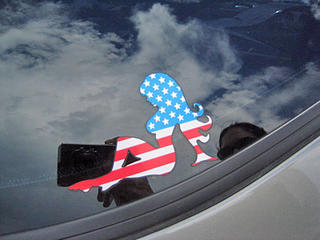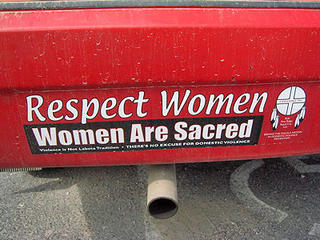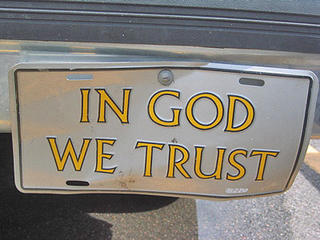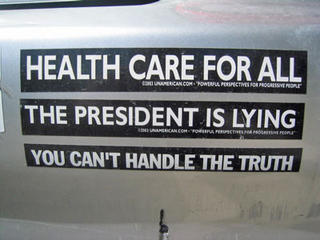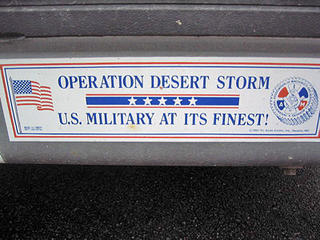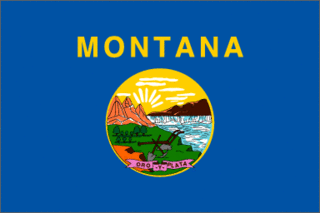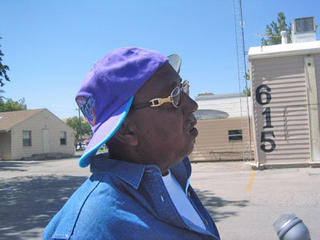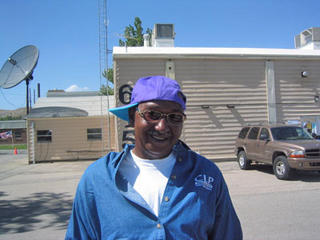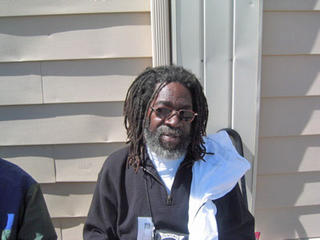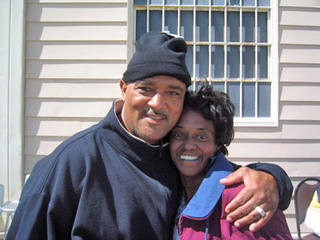Peace Activists Rally in Missoula, MT
Far from the steps of the White House, about 100 peace activists braved the cold and light rain in Missoula, Montana to rally in conjunction with the anti-war march in Washington DC. The event, called "Take Back Our Country, Bring Back Our Troops," was sponsored by the Jeannette Rankin Peace Center and Code Pink.
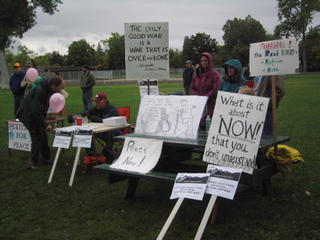
Here are excerpts from a few interviews:
Betsy Mulligan-Dague, Executive Director of the Jeannette Rankin Peace Center
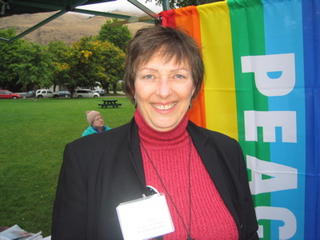
This is Missoula's version of a vocal anti-war rally in conjunction of what's happening in Washington DC. We do have some people in Montana that are there, but most of us couldn't travel there so we're joining them in spirit.
When there are protests in DC and San Francisco, you know what to expect, but a lot of people don't know what to expect from Montana. What is like protesting and having rallies here?
It's unpredictable as far as how many people are gonna show up. Missoula is a progressive community and supportive of peace and justice. There's a wide variety of folks here. We haven't really had many hecklers that I imagine you deal with in San Francisco and DC and other places. People are pretty tolerant here.
Are opinions about the war changing in Montana like they are nationally?
Yes. Our membership is up, people are coming by more and our events are better attended. People come in to the Peace Center all the time and just talk about issues or what's happening. I can tell just by listening to them that there is more hope in the peace movement. We had a lot of people -- hundreds of people -- at rallies prior to the war, but after the war started and the election turned, we really had some disappointed people that holed up and said, I'm not gonna try anymore. I think that's changing. People are coming back out and are getting involved again. They feel like there's hope.
What message would you send to people who don't know much about Montana and activism here?
The majority of Montana is pretty conservative, but also pretty tolerant. We've never been harassed and there are pockets all over the state of peace workers and activists. Missoula, in particular, is a magnet for diversity and people who are progressive.
Are there other events going on in the state?
There's one in Butte today and one in Helena tomorrow. Helena is our capital. Our state is small, so we all know each other. I know peace activists from all over the state, whereas you can probably go to a rally and not see anybody that you know, but I know all of these people. We work closely together. It's a tight knit community. I think we're looking at building from the inside instead of always focusing on rallying against something.
The DC rally received criticism for that.
They think anger is going to rev us up and get us involved and it has in the past, but I'm finding people more excited by the concept of building rather than tearing down and criticizing. We're planning a series called, "Creating a Culture of Peace." We're gonna bring in speakers every month and talk about different pieces of skill building that we need in communities to live in a peaceful, non-violent world. I get a hundred emails a day from truthout.org, moveon.org and commondreams.org and after reading them, I'm tired. I want something positive.
Sam Weaver, 20, Intern for the Montana Public Interest Research Group and Freshman at the University of Montana
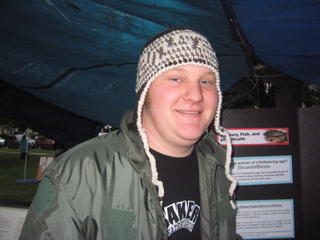
How is your work connected to the war?
If you look at the Bush administration's policies, it's almost a war on the American people. The mercury issue is insane. It's hard to believe the EPA would allow this to happen. They really are waging a war on the American people. It's pretty bad. You can't have peace if there are exploitive people out there trying to hurt the people. That's absolutely unacceptable.
How big is the mercury problem in Montana?
One-hundred percent of Montana's waterways are contaminated with mercury. It's pretty egregious. It's everywhere.
What reaction do you get from Montanans?
Montana PIRG is basically made up of students at the university and most students are sympathetic and are taken aback. They can't believe this kind of thing exists. You also find people who don't want to take the time to worry about it.
Is the anti-war movement fairly large at the University of Montana?
It is a pretty liberal campus and a lot of people are sick and tired of death and destruction.
Brad Hash, 39, Finishing a Master's in Environmental Studies
Jay Bostrom, 35, Middle School Social Studies and Spanish Teacher
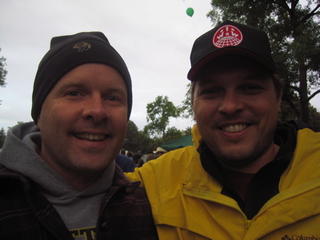
What brings you here?
Hash: I'm here to support a national movement that opposes the war in Iraq. I'm hoping these sorts of rallies increase and foster the prewar momentum that we had. I'm fully opposed to everything that George Bush is doing internationally and domestically as well. We need to have more of these events to show that we're not only looking for troops to be pulled out of Iraq, but to have better relations with other countries.
Bostrom: I'm here in solidarity with the organizations that stand in opposition to the war, but I'm also here with a more radical bent, too. I'm a wobbly and I'm proud of that. I'm part of the Industrial Workers of the World and I'm also a board member of Community Action for Justice in the Americas. I think the war is connected to the same issues we're talking about in Central and South America. I think the war is a way for them to sustain their economic policies of creating an economy hegemony throughout the hemisphere.
What is the political climate like here?
Hash: It's progressive. Compared to the rest of the state, it's definitely the liberal bastion without a doubt. Montana's got a lot of Democratic folk and a lot of liberal and progressive folk as well.
Bostrom: This is the island. I spent a year in Helena, Montana and we tried to protest there, but the climate is extremely different. That's the state capitol, which is interesting because there is a pretty strong group of peace seekers in that area, but they stand alone and isolated. Standing on the corner with a sign there is a very different experience. At the last anti-war rally we had here, there were 1,000 people, whereas in Helena, there might be 50. Helena might be the second most progressive place in the state, which is not saying much.
What message would you send to progressives in places like San Francisco? Especially those who buy the red state/blue state rhetoric?
Bostrom: We're proud of the fact that we only have 900,000 people in this state and we've done a lot to make change. Our organization itself was instrumental in getting our congressional delegation to vote against CAFTA. We led protests statewide and put a lot of pressure on them and they voted against it. During the last election, we were able to elect Governor Brian Schweitzer who has been a very loud critic of George Bush and I think that's another sign. We're a mixed bag. We should be considered a purple state because we somehow passed medical marijuana, but also passed legislation to ban gay marriage.
Hash: A lot of it has to do with agriculture and these congressional reps work with the farmers and they know first hand that NAFTA has been disastrous for Montana farmers and they're not about to let that be exacerbated by CAFTA. They know better.
Are opinions about the war changing in Montana?
Bostrom: Yes, definitely. I took a job teaching in arguably one of the more conservative areas, the Bitterroot Valley, which is just south of here. It's only 30 miles away, but it's a very fundamentalist, religious community. I'm finding the school teachers I work with, who are conservative on almost every issue, are increasingly anti-war and anti-Bush. It's changing.
Hash: Without a doubt, I would echo those sentiments. You have 200,000 people showing up in DC today to protest Bush's policies in Iraq, while the pro-war folk are putting out a few hundred people. That's a good indication of where we're going nationally. I'd say this is not only moving, it's gaining strength. The downside of that is that Bush is in his second term. What comes of this? Does he just ride this out?
Bostrom: Impeach him.
Hash: Impeach him is the thing to do. There's a legitimate movement for that. Clinton was impeached by a Republican congress over a personal extramarital affair and we have a man who has knowingly lied to the American public. He's brought the country to a war based on five lies. Five huge lies. We spent over $200 billion on this. We've lost almost 2,000 American lives and over 100,000 Iraqi lives and this is not impeachable? Is this simply because we have a Republican dominated Congress? If not, then everyone has their head in the sand. This is as impeachable as an offense gets.
Caroline Emmons, 63, Activist
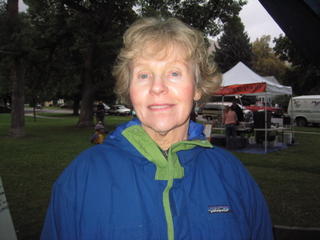
What brings you here tonight?
I'm with Jubille Missoula, which is the organization connected to Jubillee USA. We're trying to get our government and the IMF and the World Bank to cancel 100 percent of the debt of impoverished countries with no strings attached. Today and tomorrow there are meetings in Washington DC where the World Bank and the IMF are deciding whether or not they agree with the G8 debt cancellation that came out of G8 meetings in July. Even if they do, they're only doing it for 18 countries and there are a lot of strings attached. That's not enough. There are so many more countries that need it.
Does the public know enough about this issue?
No, they don't know much about it. Because there was a lot of hoopla around the G8 agreeing to cancel the debt, it looks like it's done, but it isn't done. The United Nations has a millennium development goal that includes the eradication of poverty in the world by the year 2015, but there's absolutely no way they can even come close. There's no way they can do it if the debt isn't canceled. The debt is what keeps these countries impoverished.
How did you get involved in this kind of work?
I've been involved in this work since I've lived here in Missoula. I just like peace and justice issues.
What is like being an activist in Missoula, Montana?
It's the best place in the world because everybody else that you know is one, too.
A lot of people in more Democratic states tend to write off states like Montana because it went for Bush. What would you say to them?
They shouldn't do that because not everyone here was for Bush. Missoula usually votes for the Democratic party.
Do you know anyone who was in favor of the war when it began, but is now opposed?
No, I don't know anyone who was in favor of it. I do listen to right-wing radio. My husband gets very upset when I turn it on, but I want to hear what they're saying. They seem just as pro-war as they ever were. I was around during the Vietnam war and during that time, the protesting actually had an effect on government, but I don't know whether it has any effect anymore. Millions of people all over the world demonstrated against going to war and Bush just said, well, that's just a focus group. We might have to come up with more creative solutions.
Gerry Blackman, 65
Gerry recently returned from Uzbekistan as a Peace Corps volunteer. She was supposed to stay until April 2006, but had to leave due to political turmoil. She arranged for Farok Sandearoff, the eldest son of her host family, to enroll and study at the University of Montana.
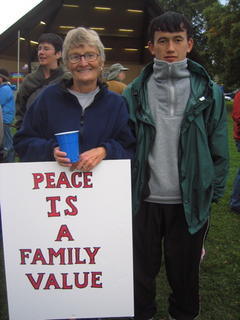
What's it like to protest in Missoula, Montana?
Missoula is the one place in Montana where this can happen on a fairly large scale. I'm originally from Great Falls, Montana, which is a little different; maybe not so progressive. It's more content with the war because they support a military base. I've lived there most of my adult life. I've lived in Missoula about 17 years. This is a place more suited to me personally. This is a community that supports and mirrors my attitudes about peace and our international relations. I find I thrive here. It's a very special community in our state.
Do you find opinions about the war changing in Montana like they are nationally?
Yes, there's a definite change. Of course, I also saw this with Vietnam. I was a peace advocate during Vietnam and I'm seeing the beginning of that here.
What message would you send to people who aren't familiar with Montana?
I think there are people everywhere in America who value peace and international cooperation. I don't think we can discount the numbers of these people everywhere in America. I think it's unfortunate if we, for the sake of convenience, categorize people into red/blue or right/left. We need to hear from people to understand the scope of opinion in our country. I strongly object to those in the mainstream media that categorize us. I don't believe it's realistic and I don't believe it represents any reality in America today.
Eddie Johnson, 26
Eddie's brother is in the Army and has been called to leave for his second tour of duty next month.
What brings you here?
I think it's important to show support. You kinda feel alone and need some camaraderie with people that feel the same way you do.
What is it like protesting here?
It's a little different here. I didn't expect this many people to show up. Missoula is definitely the one liberal spot in the entire state. We don't feel like we're persecuted for protesting.
Do you feel connected to the big protest in DC?
I do feel connected. We have Air America radio here now and I listen to that almost every day. I feel pretty connected.




